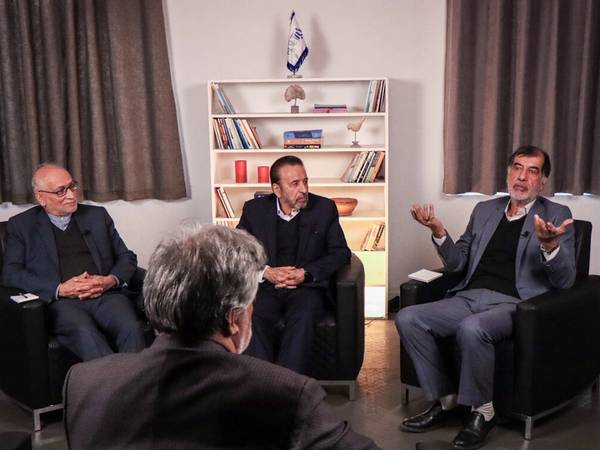Three prominent centrist and conservative figures in Iran have suggested that the country’s political doctrine must change to address its ongoing problems, especially the economic impasse.
During a roundtable discussion hosted by Sazandegi newspaper, conservative politician and Expediency Council member Mohammad Reza Bahonar, former senior lawmaker and centrist politician Hossein Marashi, and Mahmoud Vaezi, a senior aide to former president Hassan Rouhani, carefully avoided directly naming Supreme Leader Ali Khamenei as the ultimate authority responsible for the country’s major shortcomings.
They spoke cautiously, as some of their critical remarks touched on highly sensitive topics, including constitutional changes and political reforms. The veteran political insiders would not have voiced such criticisms publicly two or three years ago, before Iran's regional influence began to wane and its economic situation reached a critical stage.
They highlighted issues including the government's lack of resources, largely due to massive expenditures in the Middle East aimed at undermining Israel—spending that was undertaken without the consent of the Iranian people or parliament (Majles), as they noted.
Marashi said, "Iran's priority should be addressing its economic crisis," and "politics in Iran should not be left to military organizations," likely referring to the central role the Revolutionary Guards play both in political and economic spheres.
He added: “The government’s priorities remain focused on outdated ideological issues, such as enforcing the hijab on women and restricting access to information on the Internet, rather than tackling the country’s pressing economic crises.”
These failures have left the nation struggling in darkness and cold since November, as the oil-rich country continues to fall short in producing sufficient natural gas and electricity in generating sufficient oil export revenues.
A huge part of the country's income from oil is kept outside the government's treasury and under direct supervision of the Supreme Leader and the Revolutionary Guard.
On December 16 all government offices and schools in 26 of the 31 Iranian provinces were shut down due to blackouts, power shortages and consumption of pollutant fuels in many power plants.
Without elaborating on what was wrong with the Iranian Constitutional Law, Bahonar said that “all the articles of the constitution can be revised except a few that are about the essence of Islam and the nature of the political system as a republic.”
His remarks likely implied that institutions such as the Guardian Council, which hinder free and fair elections, could be dismantled, and that articles granting extraordinary powers to the Supreme Leader could be revised. This would help curb unnecessary spending on religious institutions and costly military ventures abroad.
Elsewhere in their debate, the three politicians said that many of Iran's problems are caused by flaws in the structure of its political system. Without saying how the current system has led to a dictatorship under the Supreme Leader, they called for a democratic political system like those in Japan, Pakistan, Germany, France and the United States.
Marashi criticized Pezeshkian for taking pride in lacking a clear plan for his government or a political party to advance his ideas. He also pointed to the Islamic Republic’s core doctrine, which centers on its ongoing struggle against what it calls “arrogant powers”—a concept now largely synonymous with anti-Americanism.
He argued that “this doctrine cannot drive meaningful progress and must be reformed, much like how China abandoned its rigid ideological approach to achieve development.”
Marashi went on to question the extensive powers of Iran's Judiciary and the absence of judicial independence. He also criticized the current Majles for consistently obstructing the government’s ability to fulfill its responsibilities.
Additionally, he emphasized that Iran’s economy has been held hostage by its nuclear program for the past 19 years. Highlighting the fall of Bashar al-Assad in Syria, he said: “Even maintaining our allies in power depends on prioritizing the economy.”
At the same time, perhaps in an effort to absolve President Masoud Pezeshkian of responsibility for the current crises, three other conservative figures, in reports published by Nameh News website, emphasized that "the Pezeshkian administration has inherited the current economic and political problems from previous governments."
